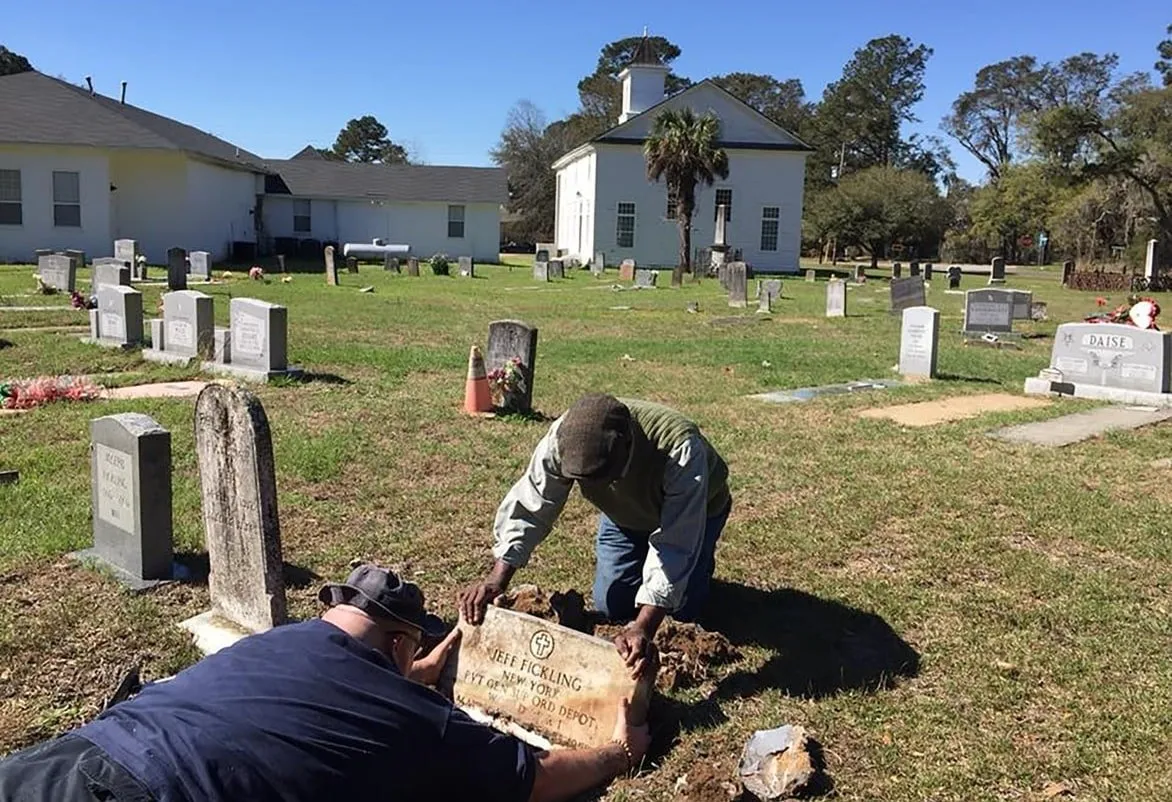By: Cory France
April 23, 2024
The Learning Lab series provides practical tips, advice, and guidance on specific historic preservation topics that are relevant to African American preservation projects. We hope these posts help community members and leaders better navigate the complexities of historic preservation work successfully.
| Short Description of topic |
|---|
| Cemeteries are essential historical repositories, encapsulating the legacies of generations. In South Carolina, African American burial grounds and cemeteries are of immense cultural and historical significance, often containing the untold stories of resilience and achievement. Here are ten tips for individuals and communities dedicated to preserving these sacred spaces, including detailed methods to enhance research and documentation efforts and a list of supportive resources available within South Carolina. |
10 Tips for Preserving African American Burial Grounds and Cemeteries in South Carolina
1. Document Everything
Comprehensive documentation is crucial. Record names, dates, and inscriptions on gravestones with photographs and written records. Use Find A Grave or Geographic Information Systems (GIS) to accurately identify and map grave locations, if available, to ensure that such details can be considered in future site planning.
2. Engage the Community
Preservation is a collective effort, often requiring input and support from others. Engaging local residents, schools, and organizations in your efforts can foster a shared commitment to preserving historic sites. Try hosting a series of community meetings, create newsletters, or start social media groups to raise awareness, share research/findings, and collect any pertinent information that could be used to further tell the story of your site(s).
3. Research Historical Significance
Start preliminary research about the history of the cemetery and those interred within it. Local archives, libraries, and online databases, such as Ancestry or Newspapers.com, can offer valuable insights about these subjects. Gathering oral histories from community elders and families connected to the cemetery can ensure that invaluable personal stories and information not found in written records can be included in your documentation of the site(s). Partner with local colleges or universities for academic support in research and documentation efforts, if desired.
4. Seek Legal Advice
Understanding the legal status of the burial ground is essential. Legal professionals can clarify ownership, rights, and state-specific laws protecting historic cemeteries. The State Historic Preservation Office (SHPO) in the state of South Carolina lacks the financial resources and legal authority for maintaining historic cemeteries, acquiring them, or enforcing cemetery protection laws. For general resources for saving historic cemeteries, visit the South Carolina Department of Archives and History here. For questions or additional information about perpetual care cemetery regulations, contact the South Carolina Perpetual Care Board. For non-perpetual care cemeteries, descendants of the interred are typically the primary regulators of their respective site(s). In many cases, a non-perpetual care cemetery may be stewarded by a nonprofit organization or private entity or individual. This information can be found through deeds or plat records located at your local register of deeds or assessor’s office.
5. Apply for Grants and Funding:
Funding for most cemetery projects is primarily sourced locally from non-public entities and relies on volunteer efforts for maintenance. There is no state agency equipped with the legal authority or financial means to maintain cemeteries. While SC Code 6-1-35 allows, but does not require, a municipality or county to preserve or protect any cemetery within its jurisdiction that has been abandoned or is not being maintained, additional funding can be sought through grants aimed at historic preservation. Numerous organizations provide resources and funding opportunities for projects dedicated to preserving historical sites, including African American cemeteries. It is advisable to contact local heritage or conservation commissions to stay informed about the latest funding opportunities relevant to the documentation, interpretation, or maintenance of your sites.
6. Establish Regular Maintenance:
Organize clean-up and maintenance days to keep the cemetery in respectful condition. This includes clearing overgrowth, fixing damaged gravestones, and ensuring accessibility, preserving the dignity of the site.
7. Promote Educational Programs:
Partner with local schools, historical societies, and community centers to develop educational programs connected to the site. Highlighting the cemetery’s history and importance can build broad support for preservation efforts, integrating these sites into the wider community narrative.
8. Leverage Technology
If accessible, use technology to raise awareness and funds. Digital platforms can facilitate crowdfunding, create virtual tours, or establish digital archives, making the cemetery’s history accessible worldwide and engaging more people in its preservation efforts.
9. Partner with Preservation Organizations
Collaborate with preservation groups for expertise, resources, and support. These partnerships can augment your efforts with professional guidance and additional resources, enhancing the effectiveness of any preservation activities.
10. Plan for the Future
Develop a long-term preservation plan. Establishing a trust or endowment can ensure ongoing care and protection, safeguarding the cemetery for future generations.
Resources in South Carolina:
South Carolina Department of Archives and History
South Carolina’s Historic Cemeteries: A Preservation Handbook
Preservation Laws (Cemeteries and Burials)
Related Laws:
Preservation and Protection of Abandoned and Unmaintained Cemeteries
6-1-35, SC Code of Laws
Destruction or Desecration of Human Remains or Repositories Thereof; Penalties
16-17-600, SC Code of Laws
Removal of Abandoned Cemeteries
27-43-10 thru 27-43-40, SC Code of Laws
Access to Cemeteries on Private Property
27-43-310, SC Code of Laws

